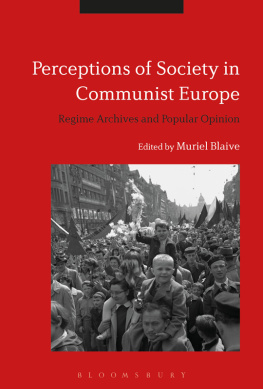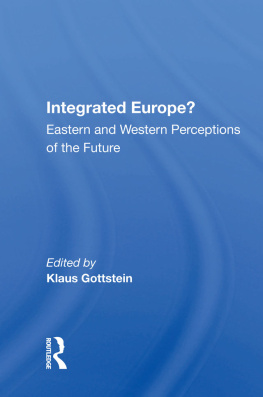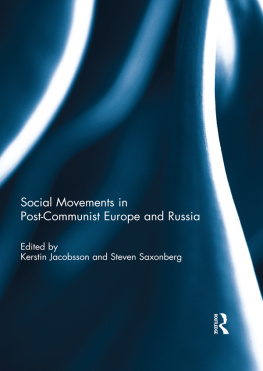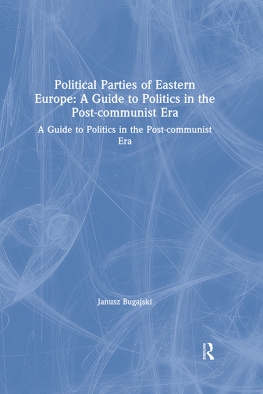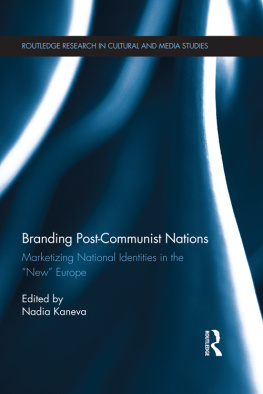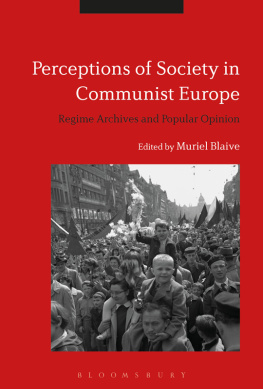Blaive - Perceptions of Society in Communist Europe
Here you can read online Blaive - Perceptions of Society in Communist Europe full text of the book (entire story) in english for free. Download pdf and epub, get meaning, cover and reviews about this ebook. publisher: Bloomsbury UK, genre: Politics. Description of the work, (preface) as well as reviews are available. Best literature library LitArk.com created for fans of good reading and offers a wide selection of genres:
Romance novel
Science fiction
Adventure
Detective
Science
History
Home and family
Prose
Art
Politics
Computer
Non-fiction
Religion
Business
Children
Humor
Choose a favorite category and find really read worthwhile books. Enjoy immersion in the world of imagination, feel the emotions of the characters or learn something new for yourself, make an fascinating discovery.
Perceptions of Society in Communist Europe: summary, description and annotation
We offer to read an annotation, description, summary or preface (depends on what the author of the book "Perceptions of Society in Communist Europe" wrote himself). If you haven't found the necessary information about the book — write in the comments, we will try to find it.
Blaive: author's other books
Who wrote Perceptions of Society in Communist Europe? Find out the surname, the name of the author of the book and a list of all author's works by series.
Perceptions of Society in Communist Europe — read online for free the complete book (whole text) full work
Below is the text of the book, divided by pages. System saving the place of the last page read, allows you to conveniently read the book "Perceptions of Society in Communist Europe" online for free, without having to search again every time where you left off. Put a bookmark, and you can go to the page where you finished reading at any time.
Font size:
Interval:
Bookmark:
Perceptions of Society in
Communist Europe
Also available from Bloomsbury
The Holocaust in Eastern Europe: At the Epicenter of the Final Solution, by Waitman Wade Beorn
Hungarian Womens Activism in the Wake of the First World War: From Rights to Revanche, by Judith Szapor
Perceptions of Society in
Communist Europe
Regime Archives and Popular Opinion
Edited by
Muriel Blaive

To my elder son, C., who was born when this project took roots and is now an adult.
M.B.
Muriel Blaive is Advisor to the Director for Research and Methodology at the Institute for the Study of Totalitarian Regimes in Prague. She is a sociopolitical and oral historian of communist and post-communist Czechoslovakia/the Czech Republic, placed in its Central European context.
Shawn Clybor received his PhD from Northwestern University. He is currently a history teacher at Dwight-Englewood School in New Jersey and manages a private collection of Czech avant-garde books and art in New York City. He has published on the political activism of the Czech avant-garde, 19201960.
Sonia Combe is Emeritus Research Associate at Centre Marc Bloch in Berlin. Her research interests focus on intellectuals in the former GDR and communist Europe, as well as the concentration camp experience under Nazism.
Martin K. Dimitrov is Associate Professor of Political Science at Tulane University in New Orleans. His research interests focus on the origins, evolution and demise of authoritarian regimes.
Adrian Grama is Postdoctoral Fellow at the Graduate School for East and Southeast European Studies, University of Regensburg, Germany, where he works on questions of social, economic and labour history in twentieth-century Eastern Europe.
Rosamund Johnston is a graduate student of Modern European History at New York University. Her research interests include sound studies, the history of broadcasting, migration and propaganda.
Marin Li is Researcher at the Institute for the Study of Totalitarian Regimes in Prague. He is also enrolled in the doctoral programme at the Institute of Economic and Social History at the Faculty of Arts, Charles University. His main area of interest is the history of the Communist Party of Czechoslovakia in the 1950s.
Jill Massino is Associate Professor of Modern European History at UNC Charlotte. She is co-editor (with Shana Penn) of Gender Politics and Everyday Life in State Socialist Eastern and Central Europe (Palgrave, 2009) and author of Ambiguous Transitions: Gender, the State, and Everyday Life in Socialist and Postsocialist Romania (Berghahn Books, 2018).
Libora Oates-Indruchov is Professor of Sociology of Gender at the University of Graz in Austria. Her research interests include censorship, cultural representations of gender in state socialism and post-socialism, gender and social change and narrative research.
Veronika Pehe is Marie Curie Fellow at the Institute of Contemporary History, Czech Academy of Sciences. Her work focuses on cultural memory, memory politics and the history of the economic transformation in East-Central Europe.
Molly Pucci is Assistant Professor of Twentieth-Century European History at Trinity College Dublin. She studies the history of communism, legal history and the history of policing in twentieth-century Europe.
Machteld Venken currently holds an Elise Richter Fellowship at the Institute of Eastern European History, University of Vienna. She studies European history, migration, border regions and children.
Even acknowledgements deserve a bit of historical contextualization. I am grateful to the Grant Agency of the Czech Republic for having funded the research project that led to this volume, entitled Rulers and Ruled: Practical and Methodological Challenges in the Historicization of a Complex Relationship, number 16-26104S. In fact, I am all the more grateful as I proposed it nine times in four different countries over fifteen years. The most amusing rejection is certainly the first one, delivered by the French Research Agency (CNRS) in 2001, for being unfeasible. Thanks to the invaluable guidance of my PhD supervisor, Krzysztof Pomian, I never doubted that it was but let this long journey be a message of hope for other scholars.
I thank my colleague at Charles University, Nicolas Maslowski, who encouraged me to persevere in my funding requests and was my original co-applicant for this project. I also thank my colleagues in the leading team of the Institute for the Study of Totalitarian Regimes in Prague, particularly Irena Fialkov. Her help in organizing the conference that shaped this volume, as well as for shouldering many necessary and time-consuming tasks pertaining to the book, was priceless. I am grateful to Thea Favaloro at New York University Prague, who agreed to host this original conference and provided a wonderful academic environment as well as legendary catering.
I cannot count myself fortunate enough that at mid-stage along this long journey, my then boss at the Ludwig Boltzmann Institute in Vienna, Thomas Lindenberger (curently director of the Hannah Arendt Institute in Dresden), and the then member of our Scientific Advisory Board, Dariusz Stola (curently director of the Polin Museum in Warsaw), significantly helped me fine-tune the project. The final version, which closely informs the conception of the present volume, owes much to them.
I would like to thank the contributors to of this book, who had to patiently endure a heavy-handed editors endless requests. I am indebted to Shawn Clybor, Jill Massino, Veronika Pehe, Rosamund Johnston, Marin Li, Molly Pucci and Adrian Grama, as well as to Annina Gagyova, John Raimo, Thomas Lindenberger and Grard-Daniel Cohen, for their critical remarks on my introduction and/or on my own chapter. Finally, I would like to thank Mark Trafford and Veronika Pehe for their excellent editing and proof-reading work. Rhodri Mogford and Beatriz Lopez at Bloomsbury Academic have been wonderfully efficient and pleasant to work with may they be thanked, too.
Muriel Blaive
The research project that led to this volume Our volume points to such transcripts in each national case. That communist propaganda consistently attempted to adapt its content to each national context is a common characteristic and not a differentiating one.
Political sciences failure in the 1990s to articulate a continuity between communism and post-communism was another source of inspiration. As simple as it may seem, the knowledge of the relationship of the people to communism before 1989 is the only way to understand their attitude towards the communist past after 1989. If there is little or no social-historical knowledge to be mobilized in order to analyse the pre-1989 attitudes, the necessary continuum between the pre- and the post-1989 period cannot be reconstructed. This is why memory infiltrated social sciences and history and attempted to fill the void. Inspired by the memory turn of the Holocaust studies but disregarding its rich history, academic discussions on dealing with the past or duty of memory partly took the place of a painstaking, old-fashioned historical research. Social sciences and history often turned to activism and transformed memory not only into an object of study but increasingly into a moral, if not institutional, necessity. But the ubiquitous presence of memory studies does little to refine the historical knowledge over this period. As historians and social scientists we are not invested with any duty of memory, but with a duty of history.
Next pageFont size:
Interval:
Bookmark:
Similar books «Perceptions of Society in Communist Europe»
Look at similar books to Perceptions of Society in Communist Europe. We have selected literature similar in name and meaning in the hope of providing readers with more options to find new, interesting, not yet read works.
Discussion, reviews of the book Perceptions of Society in Communist Europe and just readers' own opinions. Leave your comments, write what you think about the work, its meaning or the main characters. Specify what exactly you liked and what you didn't like, and why you think so.

